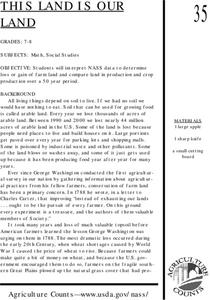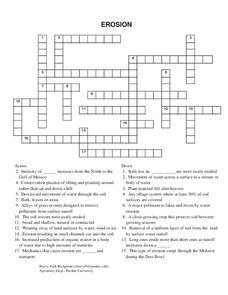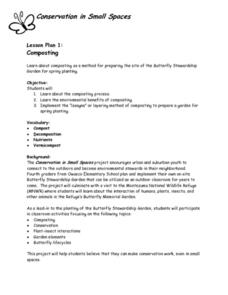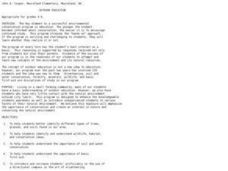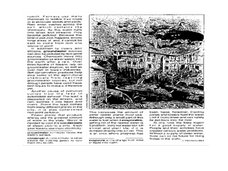Curated OER
Soils, Water and Erosion
Students participate in a hands-on experiment to compare how water and soil erosion affect soil and grass. They determine how slope affects erosion and how terracing affects erosion. They write a paragraph summarizing their data.
K12 Reader
Summarize It: President Theodore Roosevelt's 7th Annual Message to Congress
How did Theodore Roosevelt stress the importance of conservation during his time as president of the United States? Take a closer look at the language Roosevelt used himself in a 1907 address to Congress, and have your young...
Curated OER
"Wet" Your Appetite: Conserving Water
Students investigate how water is utilized in producing food. In this agriculture lesson, students examine how much water goes into the creation of their daily menu. Students create a new menu that can conserve water and cut their water...
Curated OER
Class Conservation Corps (CCC)
Students investigate how the loss of soil, a valuable natural resource, affects their lives through loss of productive land to grow food, loss of coastal land mass, and poor water quality from runoff. They design a project to keep soil...
Curated OER
Ecology and the Conservation of Natural Resources
Young scholars examine the components of ecosystems. They compare and contrast an ecosystem to an aquatic ecosystem. They examine a local ecosystem and discuss its components.
Curated OER
Ecology and the Conservation of Natural Resources Lesson 2
Learners compare and contrast abiotic and biotic factors. They discuss how these factors effect ecosystems. They answer questions to complete the lesson.
Curated OER
Soil Research
Third graders work together in groups to discover the importance of soils. Using a worksheet, they answer questions as they surf the internet. They observe three different types of soils and record their observations and use the internet...
Curated OER
Save Our Soil
Students gain an understanding of the small amount of soil available to sustain humans on earth and complete an appropriate graph or chart from their collected data. They locate some of the countries they have heard about where people do...
National Park Service
Reduce Our Carbon Footprint, Let’s Compost!
Roll up your sleeves and get a little dirty with this elementary and middle school compost lesson. All you need is a large plastic container, a couple old newspapers, some organic waste, and a few hundred worms and you're ready...
Curated OER
This Land is Our Land
Students interpret NASS data to determine loss or gain of farm land and compare land in production and crop production over a 50 year period.
Curated OER
Erosion
In this erosion worksheet, students complete a crossword puzzle given 17 clues about the types of erosion, the causes of erosion and the results of erosion.
Curated OER
Land Use Issues
Students examine soil types and determine the ability of each to absorb water. Working in groups, they time how long it takes for water to seep out the bottom of the cups. They examine soil components, conservation, erosion, and tree...
Columbus City Schools
ABC: Acid Base Chemistry
Bubble, bubble, boil and trouble! What causes common substances like baking soda and vinegar to react the way they do? Welcome your junior chemists to the wonders of acid-base chemistry using a comprehensive and fun...
Curated OER
Eye On Conservation Drainage Basin
Pupils are able to describe the importance of wetland vegetation. They describe the impacts human activities have on water systems. Students compare and contrast the effect of different soil types on water filtration.
Curated OER
Protective Agencies
This rare resource is a brief overview of some of our government protective agencies. There is a slide for each of the following: Bureau of Land Management, Department of Fish and Wildlife, National Parks Service, Environmental...
Curated OER
Conservation in Small Places - Composting
A fabulous lesson introduces the art of composting to your gardeners. In it, youngsters learn about the composting process and how it actually works. They discuss the environmental benefits of composting, and use the "lasagna" method...
Curated OER
Manage Soil
Students identify and classify soil ypes according to data on the soil triangle. Given examples, students identify soil conservation practices, using criterion assessment instrument. When giving a case situation involving soil...
Curated OER
Outdoor Education
Students increase their awareness of their natural environment. They engage in activities which emphasize the importance of conservation and create an interest in nature and conserving the natural environment.
Curated OER
Renewable vs. Non-Renewable Resources
Fifth graders, after brainstorming why conservation of resources is important, distinguish between renewable and non-renewable resources. They make a list of different types of natural resources on the board and then sort them into two...
Curated OER
KFC Lesson Plan 1 - Dirt
Learners study soil. In this soil lesson, students work at four different centers. They investigate what soil is made of,examine soil components, look at soil erosion, examine the soil in different biomes. They wrap up the lesson by...
Curated OER
Sense Of Place
Learners study ecology, listen to speakers and research conservation topics. In this investigative lesson students discuss wilderness resources, learn about Native Americans and participate in activities that help them to better...
Curated OER
The Art and Soul of the Land
Students study conservation and how different communication styles used by different conservationists. In this conservation lesson students obtain information on a cartoon or a few quotes from a conservationist and are ask to describe...
Curated OER
Don't Use it All Up
Students observe the way that a sponge absorbs liquids and discuss how we our use of natural resources affects the environment around us. They discuss the need to conserve resources so we don't run out of what we need.
Curated OER
What is Logging?
Future forestry fanatics absorb information about the impact of the logging industry and then answer ten questions. Everything is included on one webpage, so consider having learners write out their answers on a separate piece of paper....











